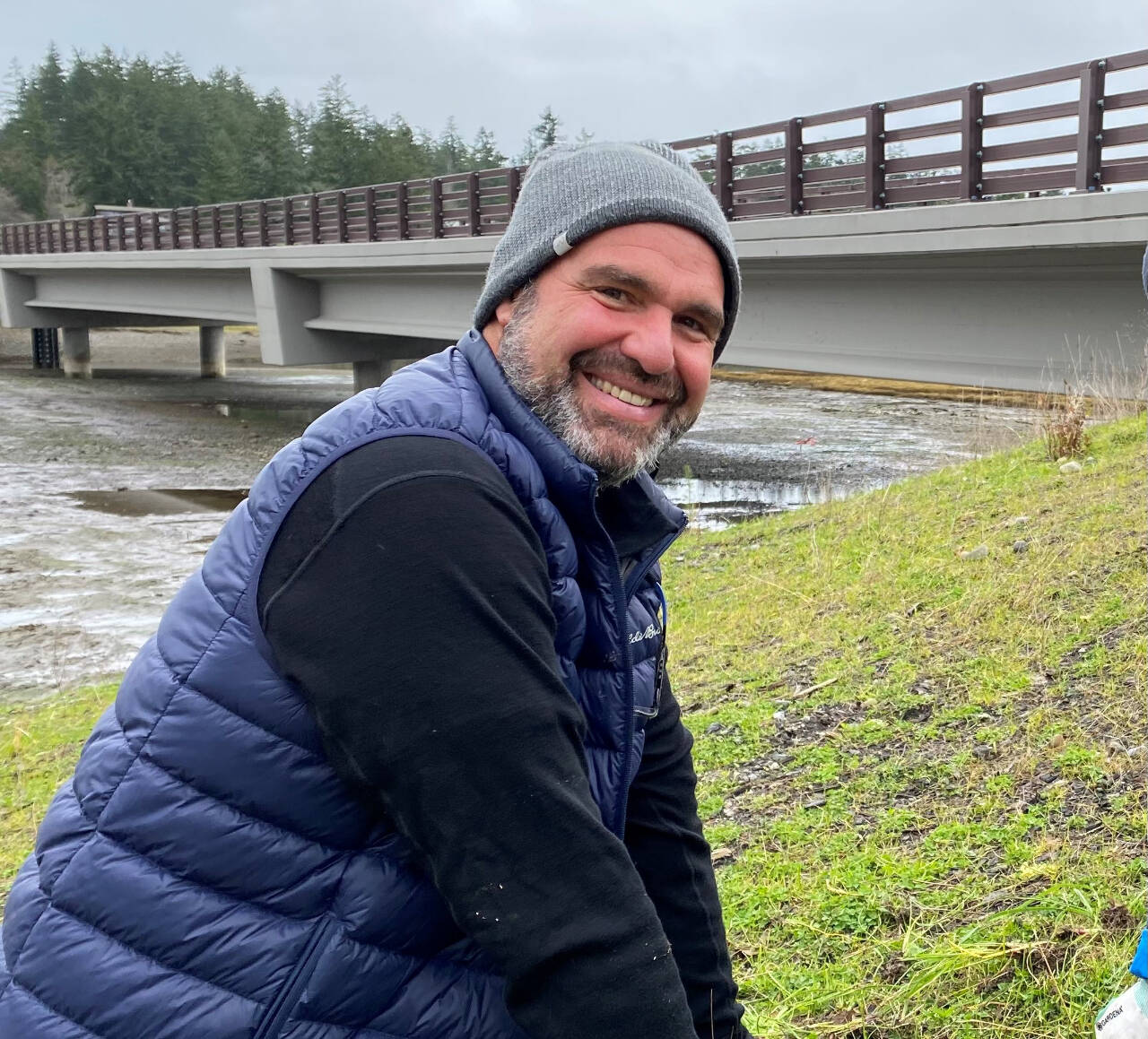Kevin Long, who has been the driving force in several major salmon habitat restoration projects in Jefferson and Clallam counties, is the 2023 recipient of the Eleanor Stopps Environmental Leadership Award.
Long, who has worked with the North Olympic Salmon Coalition since 2002, accepted the award at the Port Townsend Marine Science Center Stewardship Breakfast at Fort Worden Commons earlier this month.
“Do good deeds and don’t get caught,” he told those who attended the breakfast, “and you caught me.”
That means “don’t do it for the recognition; just do it because it’s the right thing to do,” Long said later in an interview, in which he admitted that the first thing he thought when he was told he had won the award was something along the lines of, “Oh no, now I’m going to have to make a speech.”
The Port Townsend resident said receiving recognition for conservation work is rare.
“It doesn’t happen often in this field,” said Long, 52. “The fish don’t get up and say thank you.”
But, he added, “It does feel good to be recognized.”
The award created in her honor in 2009 recognizes Stopps’ contributions to environmental conservation. The Port Townsend resident, who died in April 2012 at the age of 92, was a primary driver behind the establishment of the Protection Island National Wildlife Refuge in 1982. The award is given annually to people on the North Olympic Peninsula who have led successful conservation efforts.
Long, a senior project manager with the salmon coalition, has designed, permitted and managed numerous salmon habitat restoration projects in Jefferson and Clallam counties.
Among them are the 3 Crabs Nearshore/Estuarine project, the Morse Creek project, the Kilisut Harbor Project and numerous projects on Chimacum Creek.
The Kilisut Harbor Project replaced a causeway and small culverts with a 440-foot bridge on state Highway 116 between Indian and Marrowstone islands.
It restored natural processes to 27 acres of marine intertidal habitat and tidal-fringe salt marsh that had been severely impacted by the construction of the earthen causeway, according to a marine science center press release. Salmon, shorebirds, waterfowl, shellfish and eelgrass benefited, the release said.
The 3 Crabs Nearshore and Estuarine Restoration Project removed infrastructure, fill and armoring at the site of the former 3 Crabs Restaurant. It restored historic landforms and created public access at a newly established Washington Department of Fish and Wildlife Area along Dungeness Bay and Meadowbrook Creek.
This is the last freshwater tributary to the Dungeness River and it provides essential rearing habitat for outmigrating Dungeness River salmon, the marine science center said.
Perhaps his favorite project, when asked — “it’s funny, like asking somebody who their favorite kid is” — is the shoreline restoration work he participated in at Discovery Bay.
“Discovery Bay is where I go when I feel challenged by this work,” Long said. “I go take a walk and look around and say, ‘Oh, it’s working; it’s worth it.’”
The Discovery Bay Shoreline and Estuary Restoration Projects — there were several — were started in 2010 and ran through 2016, Long said.
He especially enjoys the results of the Maynard Nearshore Beach Restoration.
“That’s where I go to see how it has evolved since we stepped away,” Long said.
“We’re really just kind of setting up the easel for Mother Nature,” he added. “Mother Nature takes the project the rest of the way. We give her the building blocks to do that and step back.”
Restoration work isn’t an exact science, according to Long, who described the work as “cutting edge. There is no user’s manual for how we do these things.”
So it’s important to develop what he called “long vision.”
“The gratification is slow in coming,” he said. “Projects take a long time to develop. These are forever kind of projects. They will be on the landscape forever.”
Long has been working in the field of biology since graduating from Oregon State University in 1993, conducting studies on everything from legless lizards to bald eagles, the marine science center said. He is responsible for project development, permitting, implementation and the contracting required to implement the salmon coalition’s large-scale salmon habitat restoration projects.
Al Latham, the 2008 winner of the award and the author of Long’s nomination for the award, said Long “thinks of himself as an interpreter between the ecosystems we are restoring and the stakeholders, funders, designers, regulatory agencies, and construction contractors involved in getting restoration projects on the ground.”
At a statewide level, Long is an experienced project manager in the Regional Fisheries Enhancement Group Program, a network of 14 nonprofits doing work similar to that of the salmon coalition. He mentors new project managers and acts as a resource within the project manager forum.
Long’s mother, Vicki Long, and his wife, Chrissy McLean, accompanied him as he received the Stopps award, which is named for a woman known as an active member of the Pacific Northwest conservation community, founding the Admiralty Audubon Chapter and working to ensure that the Protection Island National Wildlife Refuge was established to protect breeding grounds for myriad species.
Long, who “surfs a bit,” and enjoys backpacking and “constantly gardening,” said what drives him is “just a deep love and respect for nature.”
As a child, “I was always in the creeks and chasing frogs. It kind of infected me. I wanted to work with animals in some way.”
He never planned to do this specific work.
“The job evolved into this,” Long said. “I learned by doing.”



